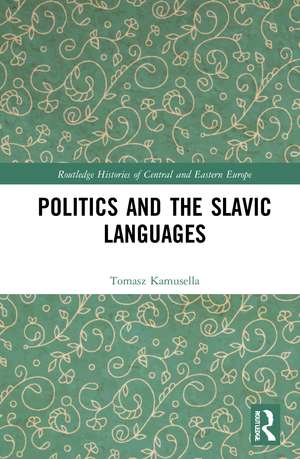Politics and the Slavic Languages: Routledge Histories of Central and Eastern Europe
Autor Tomasz Kamusellaen Limba Engleză Paperback – 9 ian 2023
Through the story of Slavic languages, this timely book illustrates that decisions on what counts as a language are neither permanent nor stable, arguing that the politics of language is the politics in Central Europe. The monograph will prove to be an essential resource for scholars of linguistics and politics in Central Europe.
| Toate formatele și edițiile | Preț | Express |
|---|---|---|
| Paperback (1) | 371.48 lei 6-8 săpt. | |
| Taylor & Francis – 9 ian 2023 | 371.48 lei 6-8 săpt. | |
| Hardback (1) | 1006.43 lei 6-8 săpt. | |
| Taylor & Francis – 18 iun 2021 | 1006.43 lei 6-8 săpt. |
Din seria Routledge Histories of Central and Eastern Europe
-
 Preț: 311.41 lei
Preț: 311.41 lei -
 Preț: 311.90 lei
Preț: 311.90 lei - 8%
 Preț: 382.96 lei
Preț: 382.96 lei -
 Preț: 310.55 lei
Preț: 310.55 lei - 9%
 Preț: 868.44 lei
Preț: 868.44 lei -
 Preț: 311.48 lei
Preț: 311.48 lei -
 Preț: 310.22 lei
Preț: 310.22 lei -
 Preț: 310.84 lei
Preț: 310.84 lei -
 Preț: 310.99 lei
Preț: 310.99 lei -
 Preț: 389.66 lei
Preț: 389.66 lei -
 Preț: 310.22 lei
Preț: 310.22 lei -
 Preț: 310.84 lei
Preț: 310.84 lei -
 Preț: 163.03 lei
Preț: 163.03 lei - 18%
 Preț: 1000.27 lei
Preț: 1000.27 lei -
 Preț: 309.79 lei
Preț: 309.79 lei - 18%
 Preț: 1000.27 lei
Preț: 1000.27 lei - 16%
 Preț: 264.98 lei
Preț: 264.98 lei - 18%
 Preț: 1006.77 lei
Preț: 1006.77 lei -
 Preț: 385.47 lei
Preț: 385.47 lei - 18%
 Preț: 1001.39 lei
Preț: 1001.39 lei - 18%
 Preț: 1000.27 lei
Preț: 1000.27 lei - 18%
 Preț: 887.43 lei
Preț: 887.43 lei -
 Preț: 387.49 lei
Preț: 387.49 lei - 18%
 Preț: 1001.90 lei
Preț: 1001.90 lei -
 Preț: 389.66 lei
Preț: 389.66 lei - 18%
 Preț: 1006.43 lei
Preț: 1006.43 lei - 18%
 Preț: 1109.18 lei
Preț: 1109.18 lei - 19%
 Preț: 269.84 lei
Preț: 269.84 lei -
 Preț: 311.41 lei
Preț: 311.41 lei - 18%
 Preț: 1003.30 lei
Preț: 1003.30 lei - 18%
 Preț: 1000.27 lei
Preț: 1000.27 lei - 18%
 Preț: 1006.77 lei
Preț: 1006.77 lei - 17%
 Preț: 259.72 lei
Preț: 259.72 lei -
 Preț: 391.02 lei
Preț: 391.02 lei
Preț: 371.48 lei
Nou
Puncte Express: 557
Preț estimativ în valută:
71.09€ • 74.56$ • 59.18£
71.09€ • 74.56$ • 59.18£
Carte tipărită la comandă
Livrare economică 01-15 aprilie
Preluare comenzi: 021 569.72.76
Specificații
ISBN-13: 9780367569853
ISBN-10: 036756985X
Pagini: 350
Ilustrații: 10
Dimensiuni: 156 x 234 x 34 mm
Greutate: 0.49 kg
Ediția:1
Editura: Taylor & Francis
Colecția Routledge
Seria Routledge Histories of Central and Eastern Europe
Locul publicării:Oxford, United Kingdom
ISBN-10: 036756985X
Pagini: 350
Ilustrații: 10
Dimensiuni: 156 x 234 x 34 mm
Greutate: 0.49 kg
Ediția:1
Editura: Taylor & Francis
Colecția Routledge
Seria Routledge Histories of Central and Eastern Europe
Locul publicării:Oxford, United Kingdom
Public țintă
PostgraduateCuprins
1. A Brief Un-Natural History of Languages in Europe 2. Non-State (Minority or Regional) Slavic Languages 3. The Internet: A New Frontier 4. The Politics of Script 5. Pluricentric or Monocentric? 6. Russian as a Pluricentric Language? 7. Conclusion: The Dilemma of Numbers 8. Addendum: The Declaration on the Common Language 9. Postscript on Methodology: People See What They Want
Notă biografică
Tomasz Kamusella is reader in modern history at the University of St. Andrews, United Kingdom.
Descriere
Through the story of Slavic languages, this timely book illustrates that decisions on what counts as a language are neither permanent nor stable, arguing that the politics of language equates politics in central Europe. The monograph will prove to be an essential resource for scholars of linguistics and politics in Central Europe.
